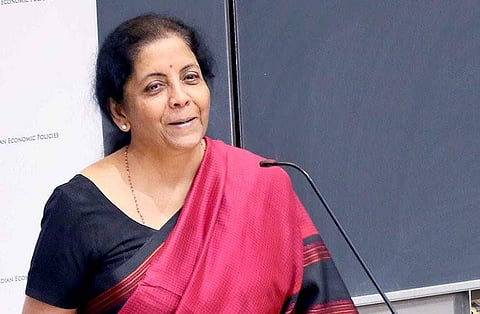

WASHINGTON: India is committed to have a sound macro-economic environment conducive to fuel growth and ensure inclusive development, notwithstanding the recent slowdown, Finance Minister Nirmala Sitharaman said on Saturday.
Addressing the annual meeting of the International Monetary Fund (IMF) here, Sitharaman said India is firmly committed to the path of fiscal consolidation. "Fiscal deficit has been budgeted to be 3.3 per cent of GDP in FY 2019-20 compared to the 3.4 per cent in the preceding year," she said.
India, the minister said, has taken diverse policy levers as part of the Modi government's series of reforms to address the challenges being posed by slowdown in country's growth. "Notwithstanding the very recent slowdown, our potential growth rate in the coming years is much higher. With a prudent mix of policies, we are committed to have a sound macro-economic environment conducive to fuel growth and ensure inclusive development. We, in India, have taken frontloaded action using diverse policy levers to address the challenges being posed by slowdown in country's growth," she said.
As against India's real growth rate of 6.8 per cent in 2018, the IMF in its latest World Economic Outlook released on Tuesday, projected the country's growth rate at 6. 1 per cent for 2019 and noted that the Indian economy is expected to pick up at 7 per cent in 2020.
Sitharaman said India has provided impetus to growth by rationalising and reducing corporate tax rates that will stimulate private sector investment in infrastructure and industry.
"We have also taken a number of sector specific measures to support growth. The Reserve Bank of India has reduced policy rates five times this year by a cumulative 135 basis points recognising the policy space it had. Supported by fiscal and monetary actions, an inflation trajectory in line with the inflation target and progressive structural reforms, we expect investment to revive, consumption to remain robust and growth to return to a higher trajectory soon," she said.
Noting that there are risks at various levels which can adversely affect the growth momentum, Sitharaman said it is pertinent in global economy to mention that external factors like trade tensions and other geopolitical uncertainties can have overwhelming deleterious effects.
"We need to think of ways whereby the IMF and other international organisations including the World Trade Organisation, as also this forum and the member governments can work towards evolving a mechanism to mitigate these risks and boost mutually beneficial engagements," she said.
As a dynamic economy, the minister said, India believes it has a key stake in nurturing global cooperation. "Hence, we reiterate our faith in the multilateral system to provide a platform for equitable partnership," she said.
During her address, Sitharaman said that the Indian economy has shown resilience against the global headwinds.
However, with the continuing subdued global demand conditions and a cyclical downturn in India that was exacerbated by some sector-specific issues, it has witnessed some slowdown in recent quarters, she noted.
Stating that the idiosyncratic sector-specific issues have since been substantially resolved, she said that the expected recovery has been reflected in IMF projections. "The authorities have taken a series of growth supporting measures including resolution of impaired assets of banking sector, bank recapitalisation, cut in the corporate income tax rate, resolution of NBFC liquidity stress and monetary easing that are expected to provide significant boost to investment and consumption," she said.
Sitharaman said the government's adherence to the fiscal glide path will provide adequate headroom for private sector investment and supplement the growth supporting measures initiated. Notwithstanding the adverse global economic environment, India's external sector has continued to be resilient.
She asserted that the current account deficit has stayed on average below 1.5 per cent of GDP during the past 5-year period. "The level of foreign exchange reserves has gradually increased to USD 434.6 billion as on October 1, 2019, equivalent to 10 months of imports cover. Even though global FDI flows have slackened in recent years, net FDI flows to India during the current year (April-July) have grown by 55% over the preceding year," the minister noted.
She said that sensing the policy space in terms of current and projected inflation being below the inflation target, the RBI acted in a forward-looking manner and, taking into consideration its assessment of domestic and global slowdown, started cutting its policy rates since February 2019.
"It has since lowered its policy rates by 135 bps and the transmission is expected to gather speed ahead. The CPI inflation has edged up a bit, largely in line with the trajectory anticipated by RBI and was at 3.2 per cent in August 2019. The benign inflation outlook provides headroom for policy action to close the negative output gap. Addressing growth concerns by boosting aggregate demand, especially private investment, assumes the highest priority at this juncture while remaining consistent with the inflation mandate," Sitharaman said.
The finance minister told the IMF that with persistent efforts, the overhang of stressed assets in the banking system has declined. The Insolvency and Bankruptcy Code is proving to be a game changer.